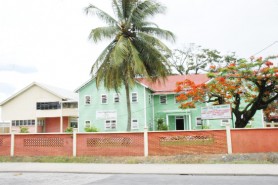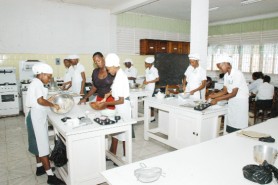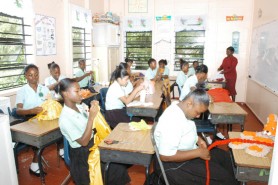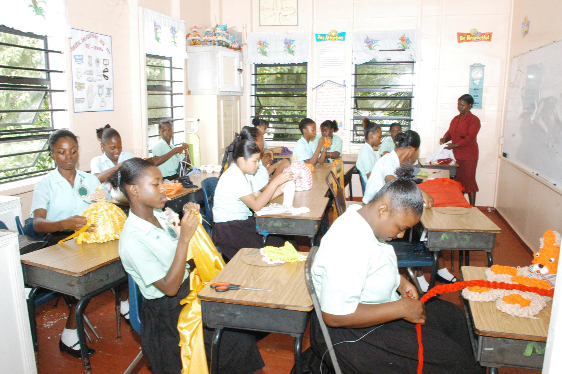Elevating the Carnegie School of Home Economics to its proper place
Some weeks ago in the course of an interview with the a senior manager of the Pegasus Hotel the question of meeting the challenge of finding skills to meet the various disciplines associated with the day-to-day running of hotels and guest houses arose and my interviewee immediately began to sing the praises of the Carnegie School of Home Economics, pointing out in the process that he believed that but for Carnegie most of not all of the major hotels in Guyana would probably be in dire straits.

Hotels and guest houses are not the only potential employers of persons with skills that commonly fall under the umbrella of Home Economics. It would appear that more and more ‘openings’ are being created on cruise liners for persons with such skills and while, for many years, few Guyanese secured those kinds of jobs, it would appear that an increasing number of local people are taking advantage of such openings.
My interviewee at the Pegasus explained that the people with the skills that were being sought by the hotel and guest house sector tended to go round in a circle, working with one local establishment or another before eventually disappearing onto one cruise ship or another. That meant that there was always a demand for graduates of Carnegie and my friend at the Pegasus told me quite unpretentiously that he had come to cultivate a considerable respect for the role that the School was playing in helping to sustain the Hotel Industry.

Probably because not much of its old wooden architecture has changed since its establishment in 1933, I had always come to associate the Carnegie School of Home Economics with women who may not have done as well as they would have wanted to in school and were now seeking to learn a trade – more likely than not, cooking or home-making. It took that Pegasus interview for me to recognize the nexus between the Carnegie School of Home Economics and the country’s Hotel and Hospitality Sector as part of the broader tourism and hospitality sector.
Apparently, four years after its establishment the School, originally known as the Carnegie Trade School, was taken over by government. Up until 1958, Carnegie ran a thriving trade in producing ladies garments and uniforms for government messengers, a pursuit that helped support the organization. Its primary goal, however, was to relieve unemployment among women while providing them with critical life skills.
In 1971 the School established a Catering Section in order to provide more specialized training in food preparation and service and as part of that section the School created a small restaurant to provide some measure of practical training for its graduates.

It is not, however, my intention to provide readers with a history lesson on Carnegie but rather, to make the point that the institution appears to have been both under-used and under-resourced over the years, given what my friend at the Pegasus believes is its level of importance to the hotel and hospitality sector. The building is still pretty much in its original state, the restaurant is quaint but wholly inadequate as a teaching tool and the whole place has about it the appearance of an institution that is struggling to sustain itself.
The establishment of a separate catering section in 1971 was a signal development in the history of the Carnegie School of Home Economics. It signaled the ‘graduation’ of the School from simply being an employer and training ground for young women to being an institution that could be centrally involved in building a stronger hotel and hospitality industry. The records of the school indicate that between the late 1980’s and early 1990’s the School benefitted from an infusion of financial and technical assistance by external agencies including the Association of Canadian Community College and the International Development Agency though there is no real evidence of any significant infusion of state support designed to take Carnegie ‘to the next level,’ – so to speak – that is, to a level consistent with the vision of having the organization serve as a training ground for employees in the hotel and hospitality sector.
Nonetheless, the Carnegie School of Home Economics has been able to offer several professional courses including a Diploma in Catering and Hospitality and Certificate Courses in Food and Beverage Service, Hot Meal Preparation, Bake Shop Management, Household Management, Garment Management, and Hairdressing and Cosmetology. In addition to these full-time courses Carnegie also offers evening courses in various disciplines including Cake and Pastry Making, Fabric Design, Advanced Cookery, Cake Decoration, Floral Arrangement and Dressmaking.
Interestingly, the Diploma in Catering and Hospitality allows for specialized training in Food and Beverage Service and Food Preparation and Bake Shop Management, disciplines that fit in neatly with the demand for trained employees to fill the many positions that would have been created in recent years on account of the emergence of a surfeit of smaller hotels and guest houses.
Setting aside the role which the Carnegie School of Home Economics plays in providing a pool of trained graduates to meet the needs of the Hotel and Hospitality sector, its evening classes also allow for training the facilitates self-employment and career opportunities in areas such as catering, dressmaking and art and craft production, jobs that can in themselves be lucrative.
What is perhaps most surprising about the Carnegie School of Home Economics is the fact that it has not benefitted from the kind of promotion commensurate with the role that it has played over the years in supporting the Hotel and Hospitality sector. Indeed, it seems to me to make every sense – given the unique role that it plays in support of our stated ambition to strengthen our capacity to provide a higher quality of service to the tourist industry – to position the institution to better play that role. Contextually, it seems to me that the Carnegie School of Home Economics no longer belongs under the administration of the Ministry of Education. The available evidence suggests that that Ministry already has its hands filled with all of the various challenges associated with the administration of the conventional education system and that, at any rate, Carnegie is probably much more closely linked to the hospitality and home-making sectors than it is to the orthodox education sector.
Perhaps one of the reasons why Carnegie has not benefitted from the growth and recognition which it so richly deserves is because, traditionally, the services which the institution has offered have been marginalized, pushed to one side in preference to the mainstream curriculum offered by the University of Guyana or even the Cyril Potter College of Education. Indeed, it would perhaps be fair to say that Carnegie is probably yet to to emerge from the shadow of its own original stated goal of “relieving unemployment among women.” The fact of the matter is, however – and how we have apparently failed to recognize this is beyond me – is that, given what we say is the significance of the tourism and hospitality sectors as potential growth areas in the national economy, the Carnegie School of Home Economics has assumed an entirely new significance. The need to elevate the institution to the level that allows it to respond to at least some of the imperatives associated with the growth and development of the of the aforementioned sectors can hardly be more evident and I believe that it is the private sector rather than the government that ought to play the leading role in taking the institution forward.

